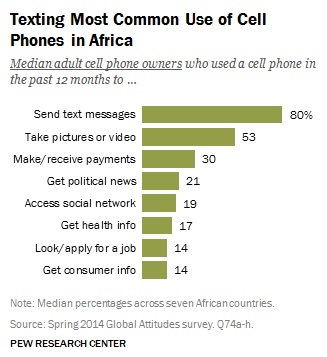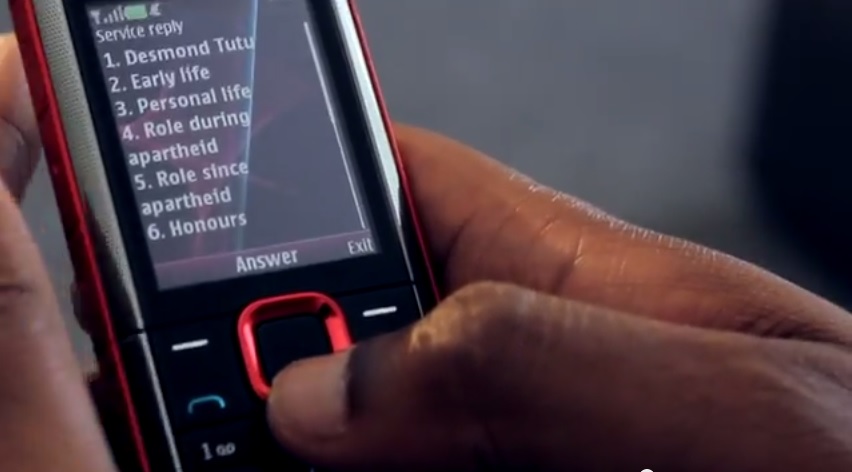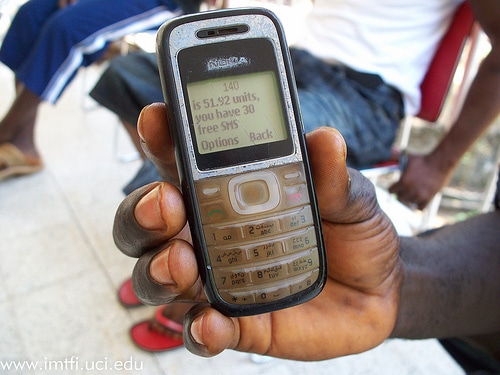This article was published in December 2015.
“Mobile is like the railway system; there’s 1st, 2nd and 3rd class. In the first class, we have incredible devices — iPhones, Lumias, Androids — which connect to the internet. But at the bottom of that pile we have pure USSD, a truly remarkable technology.
If 4G and LTE were the Ferraris and Lambroginis flying across the highway then, several layers below the paint, below the sand and all the dirt and tar of the road is USSD. And the fact that you can communicate with it on every level is fantastic.”
“SMS on the other hand, is like the paint on the road; SMS is by far the most important and biggest communication mechanism in the world” — Toby Shapshak, Editor of Stuff Magazine.
The beauty of SMS (and by extension USSD, which is essentially real-time SMS) is that it can be used on the lowest class of devices. It is also the only messaging channel that is truly platform independent.
These are the major advantages SMS has over OTT services like WhatsApp and BBM. It doesn’t matter if not all your contacts are on WhatsApp or BBM or 2go, they can all receive and send SMS. They can all dial USSD codes. And that is why in emerging markets like Africa, the most innovative and disruptive of services are built on SMS, cue Mobile Money.
While online messaging is about twice as big as SMS, SMS usage continues to steady globally and it is easy to see why. Of course, in developing markets, like most of Africa and India, where cost of SMS is relatively high, online messaging still reigns supreme. But this only means there is plenty more room for SMS to grow. In more mature markets like Japan and South Korea where SMS has peaked, OTT and SMS happily coexist. As SMS prices continue to decline (and decline they will) more people will become as comfortable with sending SMS as they are with “pinging”. It is only a matter of time.
What does this mean for African developers?
Among Africa’s biggest tech markets, South Africa and Nigeria lead with over 89% cellphone penetration. That means over 150 million Nigerians own a cellphone. Of that select population however, only about 30% own a smartphone. This means if you focus on internet-based or app-only services, your addressable market is only about 46 million, which is not bad in itself, until you remember that only 16% of people globally will try out an app more than twice.
SMS on the other hand is a gold mine. Ninety-seven percent of SMS messages globally are read within 5 seconds. Average response rate for SMS is 26%, as against 5% for email. (Mobile Data Association). Among the common uses of cellphones in Africa, text messaging (SMS) is most prevalent with 80% usage.

Bottomline: there is still some untapped potential in the subtle gold mine that is SMS. Forward thinking developers can start looking for ways to redefine their mobile strategy. An interesting case study developers can look to for inspiration is Wikipedia Text.
Wikipedia Text

The online encyclopaedia, Wikipedia sees about 517 million unique views a month but Africa and India combined account for only 65 million of those views. That’s 30% of the world population accounting for a meagre 12% of Wikipedia monthly views, largely due to poor penetration — and high cost — of internet.
Wikipedia Zero was originally created to give free internet access to Wikipedia, on mobile to users in emerging regions. By striking deals with local telcos, they achieved something very similar to Facebook Zero and Google Free Zone. However that fact that something is free does not necessarily mean it is accessible. As quite a large number of people in Africa still don’t have internet-enabled phones, there was only so much Wikipedia Zero could achieve.
Consequently the Wikimedia Foundation collaborated with Praekelt Foundation to offer Wikipedia Text — free Wikipedia access to people with basic phones. And what was the core technology behind it? You guessed right — USSD. Yes, the same basic technology you use to check you airtime balance.
How did Wikipedia Text fare? The service launched in Kenya late October 2013. By the first month there were over 118k SMS search queries. That number grew to about 700k in just 6 months. Search queries included phrases like “snake bites”, “removing ink on clothes”, “Flight MH370” and “Illuminati”. To get a better idea how the service works, you can watch this YouTube feature.
But it’s not just in learning or academia that SMS-based service can be utilised. Even SMS gaming is possble
SMS Fotbal

In 2011, a team from Romania led by Dan Virtopeanu developed a social multiplayer game based entirely on SMS. They called it SMS Fotbal (Football in Romanian). SMS Fotbal, simple in its implementation, was a true mark of sheer genius. The game simulates a football match between teams of 3 players.
Basically, players participate by sending different commands for passing, shooting or dribbling to a shortcode number, at premium SMS rates. Players get notified for free whenever the virtual ball is in their possession and have a certain time limit to respond with the appropriate command. The game was reportedly very addictive, especially as full-fledged championships were organised with the incentives of cash and gift prizes. Just like that an entirely novel genre of gaming was created – SMS Social Multiplayer Games (SSMG).
Fun fact: The SMS industry is worth over $130 billion. Apps on the other hand are worth only about $25 billion. App revenues will probably not grow more than $77 billion by 2017, even as smartphone penetration will continue to increase.
There definitely is a lot of room for innovation in SMS. Perhaps the best example of how innovative and disruptive SMS-based services can be is Mobile Money. Who would have thought 10 years ago that a financial service based solely on SMS technology could be the literal death of banks in Kenya? M-pesa Mobile Money now handles transactions worth nearly 50% of Kenya’s GDP. It is that serious.
The M-pesa story is a reminder of how basic technologies like SMS and USSD can help mobile services reach critical mass. If it is possible to disrupt the banking industry with SMS, it is possible anywhere else. It begins the moment you decide to put on your thinking cap.
Do you know any other innovative ways to build services on top of SMS? Please share your views in the comments section below.
Photo Credit: DaveBleasdale / imtfi via Compfight cc











